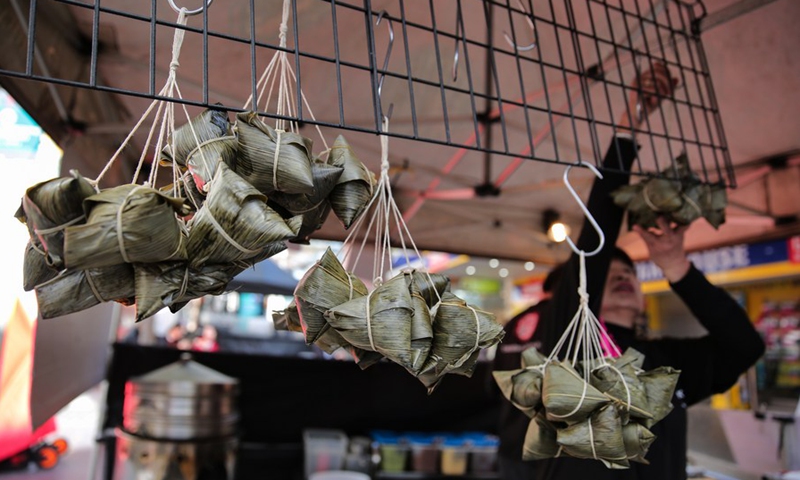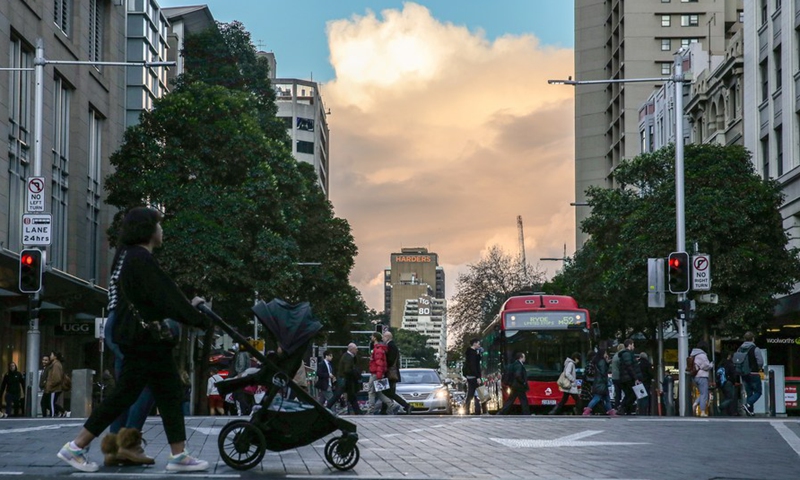Traditional food Zongzi helps Australian Chinese under pandemic find taste of home
Source:Xinhua Published: 2020/6/25 15:49:51

A vendor prepares Zongzi, a traditional Chinese food made of glutinous rice wrapped in bamboo leaves, at a food booth amid the COVID-19 pandemic in Sydney, Australia, on June 19, 2020. (Xinhua/Bai Xuefei)
With social restrictions still on shopping and dining in restaurants, and no dragon boat race, making and eating Zongzi has become the only way for many Australian Chinese to celebrate the Dragon Boat Festival, which fell on Thursday this year.
Zongzi is a traditional and iconic food, which Chinese people enjoy on the day of the Dragon Boat Festival. It is a sticky rice dumpling wrapped up with bamboo or reed leaves. Normally, people in southern parts of China like to eat salty ones, having sticky rice with pork, salted yolk or even mushrooms and chestnuts while people in northern parts of China prefer the sweet variety, having sticky rice with red jujubes or grinded red beans.
Zhang Peng, owner of Ample Grocery in Wollongong, started to replenish her Zongzi stock nearly three months before the Dragon Boat Festival.
"Due to the COVID-19 restrictive measures, the logistics was affected and many products were in shortage weeks before. Zongzi is very important for the Dragon Boat Festival and the flavor diversifies. I want to make sure every customer could find his or her favorite ones," Zhang told Xinhua.
Getting enough stock was not the only challenge posed by the pandemic. To facilitate customers who were not able to go shopping for various reasons, Yan Zhe, manager of Ustore in Zetland, opened an online ordering and home delivery service.
"For safe and health, we use our own staff and cars to deliver. All the Zongzi are delivered to customers the same day they are delivered to our store by the food processors," Yan said.
He told Xinhua this new way of selling Zongzi not only helped more people be able to enjoy a taste of home, but also flourish his business. His store already sold hundreds of Zongzi, and some new flavors such as the purple sticky rice with grinded red beans were sold out before the festival began.
Nevertheless, there are some positives to life under the pandemic, such as more time spent at home.
Zhang told Xinhua the sales of finished Zongzi in his store reduced 30 to 40 percent this year, but the raw materials for making Zongzi such as sticky rice, leaves and red beans witnessed a remarkable increase because many people now have time to cook, and would like to try the traditional technique for themselves.
"Even some local Australians bought materials and make Zongzi with their Chinese friends. Many friends of mine also showed their products on the social media. No matter it looks good or not, it is the atmosphere of the festival, and that matters," he said.

Pedestrians walk on a street in Sydney, Australia, on June 24, 2020. (Xinhua/Bai Xuefei)
This year Annie, whose son studies in Australia, tried to wrap Zongzi herself. Her husband works in China and cannot celebrate this year's festival with them due to the travel ban. She thought the traditional way of celebrating might bring a stronger sense of ceremony.
"We took video of how to make Zongzi and send to my husband. This makes us feel like we are celebrating the festival together," Annie said.
Unlike Annie, Mrs. Jiang has hand-made Zongzi for dozens of years. Her Zongzi, large in size, with rich fillings and classic recipe, have become a signature snack in the restaurant run by her son in northern Sydney.
It takes her more than one whole day to prepare, wrap and cook the Zongzi, but Jiang never complained nor gave up, even though the restaurant and their booth in the local market were affected by the pandemic.
"Our hand-made Zongzi is very popular among the regular customers, especially during the Dragon Boat Festival. Some of them even drive from other suburbs. They told me it is the taste of home and that's why I will continue to do it," she said.
Posted in: ASIA-PACIFIC